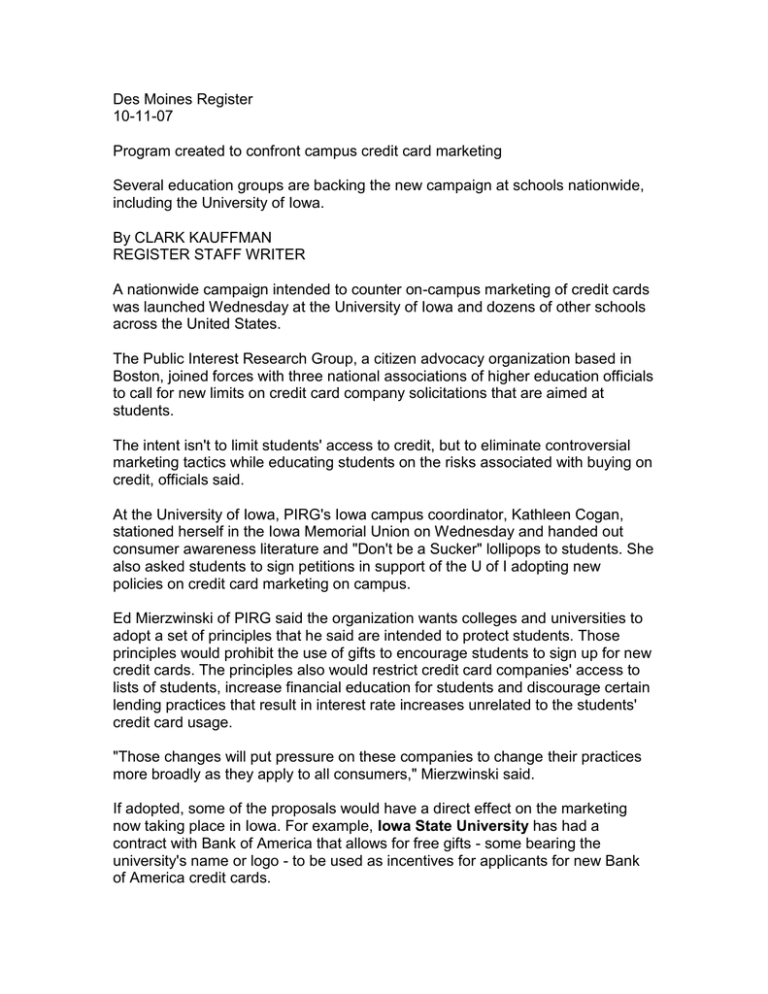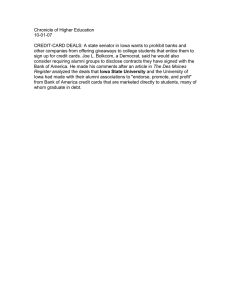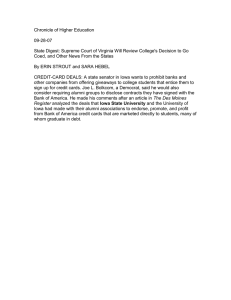Des Moines Register 10-11-07 Program created to confront campus credit card marketing
advertisement

Des Moines Register 10-11-07 Program created to confront campus credit card marketing Several education groups are backing the new campaign at schools nationwide, including the University of Iowa. By CLARK KAUFFMAN REGISTER STAFF WRITER A nationwide campaign intended to counter on-campus marketing of credit cards was launched Wednesday at the University of Iowa and dozens of other schools across the United States. The Public Interest Research Group, a citizen advocacy organization based in Boston, joined forces with three national associations of higher education officials to call for new limits on credit card company solicitations that are aimed at students. The intent isn't to limit students' access to credit, but to eliminate controversial marketing tactics while educating students on the risks associated with buying on credit, officials said. At the University of Iowa, PIRG's Iowa campus coordinator, Kathleen Cogan, stationed herself in the Iowa Memorial Union on Wednesday and handed out consumer awareness literature and "Don't be a Sucker" lollipops to students. She also asked students to sign petitions in support of the U of I adopting new policies on credit card marketing on campus. Ed Mierzwinski of PIRG said the organization wants colleges and universities to adopt a set of principles that he said are intended to protect students. Those principles would prohibit the use of gifts to encourage students to sign up for new credit cards. The principles also would restrict credit card companies' access to lists of students, increase financial education for students and discourage certain lending practices that result in interest rate increases unrelated to the students' credit card usage. "Those changes will put pressure on these companies to change their practices more broadly as they apply to all consumers," Mierzwinski said. If adopted, some of the proposals would have a direct effect on the marketing now taking place in Iowa. For example, Iowa State University has had a contract with Bank of America that allows for free gifts - some bearing the university's name or logo - to be used as incentives for applicants for new Bank of America credit cards. But John McCarroll, an ISU spokesman, said some of the proposed principles, such as financial education for students, call for policies that are in place at ISU. Others, such as restrictions on access to student lists, would require a change in Iowa law, he said. The most immediate effect of the PIRG campaign could be on the credit card companies that do not have long-term, revenue-sharing agreements with schools and their alumni groups. In Iowa City, for example, the U of I guarantees the alumni association - and, by extension, Bank of America - special access to U of I students, university supporters and campus facilities. In return, the bank pays the alumni group roughly $1 million per year. Citibank has tried to solicit U of I students, but that bank has done so by offering students free food at off-campus restaurants in return for filling out a credit card application. Mierzwinski said PIRG's intent is not to limit the competition faced by credit card companies that enjoy exclusive access to campuses because of their revenuesharing agreements. He said marketing by both the school-approved companies as well as their competitors needs to be reformed. "Under no circumstances should an exclusive contract allow a company to market outside of the principles," he said. The American Council on Education, National Association of Student Personnel Administrators and National Association of College and University Business Officers also support the effort.

